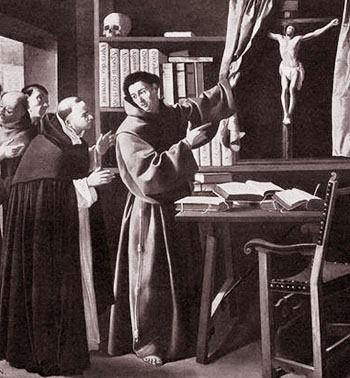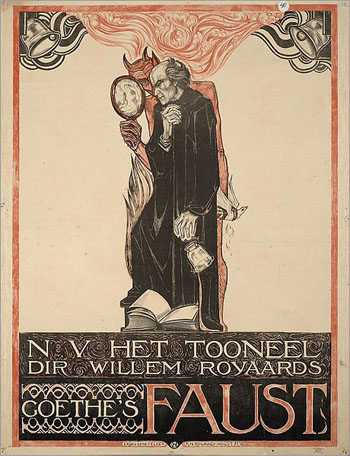The Saint of the Day
 |
 |
 |
 |
 |
 |
 |
St. Bonaventure - July 14
St. Bonaventure, Cardinal and Doctor of the Church, was born in Bagnoregio, then part of the Papal States in Italy in the year 1221. At age four a grave illness put the boy's life at risk and, after unsuccessfully trying every means to save him, his mother begged St. Francis, who was still alive, to place his hands on him and restore his health.
She promised St. Francis that she would dedicate the boy to the the service of God in the Franciscan Order if her prayers were heard. St. Francis prayed over the child and the boy was immediately healed. Before working that great miracle, St. Francis exclaimed in Italian: "O buona ventura!" [What a good occurrence!] from that time onward, the child was called Bonaventure, even though his baptismal name was John.
 At age 22 he entered the Franciscan Order to fulfill his mother's promise. After the novitiate Bonaventure was sent to the University of Paris to hear the classes of the famous Alexander of Hales. In all studies he sought first the honor of God and his own sanctification, and renounced all vanities and pernicious curiosities in his studies. He was content to seek the necessary, without losing his time in useless discussions, which often obscure the truth more than serve the good cause.
At age 22 he entered the Franciscan Order to fulfill his mother's promise. After the novitiate Bonaventure was sent to the University of Paris to hear the classes of the famous Alexander of Hales. In all studies he sought first the honor of God and his own sanctification, and renounced all vanities and pernicious curiosities in his studies. He was content to seek the necessary, without losing his time in useless discussions, which often obscure the truth more than serve the good cause.
His life was so pure that his master, Alexander of Hales, said: "It seems that original sin had no place in him." Although his life was a continual practice of penances, his face reflected a joy that only pure souls know.
At age 32 he was named Doctor of Theology in the University of Paris. Five years later he was elected General Superior of the Franciscan Order.
Amid his work as General Superior, St. Bonaventura found time to write books on different subjects in which he gave proof of a vast erudition and competence. He composed beautiful works on the devotion of the Blessed Virgin Mary and also a biography of the founder of the Order, St. Francis of Assisi.
He was contemporary of St. Thomas Aquinas and at times would receive a visit from him. St. Thomas was a great admirer of Bonaventure's sanctity and wisdom. On one of his visits, St. Thomas asked St. Bonaventure from what books he drew his inspiration. The latter pointed to the Crucifix and said: "This is the library from which I draw all that I teach and all that I write."
When Pope Gregory X elevated him to the Cardinalate, the messengers of this pontifical honor found the Saint busy working in the kitchen. Although raised to this high position, Bonaventure continued his life as a humble religious.
Invited to take part in the Second Council of Lyon, he raised general admiration for his deep wisdom as well as for his zeal for the cause of the Church.
Death surprised him during this Council on July 15, 1274; he was only 53 years of age. (O Legionário, July 10, 1938)
* * *
There is a text in the book The Glories of Maria in which St. Bonaventure addresses an interesting question.
Commenting on when the Angel Gabriel told Our Lady that she had "found grace before God," the question rises why he said those words? Is it not only before God that we can find grace? Then, would it not be the case to simply say that she had "found grace"?
St. Bonaventure, who is a Doctor of the Church, explains that it was necessary to say "before God" because people can also find grace before the Devil. There are persons who fall into the "good graces" of the Devil.

 To fall into the "good graces" of the Devil does not mean that the Devil can have love for anyone, because in his state he is incapable of loving anyone. He only loves himself and hates God. The devils who are in Hell hate one another deeply. And, let me add, there is a good reason for that – all them are worthy of hate.
To fall into the "good graces" of the Devil does not mean that the Devil can have love for anyone, because in his state he is incapable of loving anyone. He only loves himself and hates God. The devils who are in Hell hate one another deeply. And, let me add, there is a good reason for that – all them are worthy of hate.
Then, St. Bonaventure asks: How can a person fall into grace before the Devil? This takes place when the Devil perceives that a person has a psychology whereby the goods of this earth can induce him to sin and harm him spiritually. Then, the Devil offers that person the goods of this earth so that the person, receiving those goods, loses his soul.
St. Bonaventure continued saying that many times these goods are given by the Devil so that the person will remain in a state of attachment to them, becoming vain, greedy and enjoying the good life; he thus becomes incapable of sanctifying himself. It is, therefore, a way for the Devil to cause that soul to be lost.
St. Bonaventure presented Holofernes – the Assyrian general beheaded by Judith in the Old Testament – as the type of man who found grace before the Devil. The Saint showed how Holofernes had all the prosperity and goods of this earth that an evil man can have, which were offered by the Devil.
Sometimes we see some children of the Revolution who quickly gain large fortunes, great fame or enormous popularity; if we examine their lives carefully we see that those were gifts the Devil gave those persons.
In my life I have observed that some persons are gifted with an inexplicable capacity to attract. They are not intelligent and have no special quality; they are common persons. But the way they smile and treat others has something imponderable that is in them. Through this imponderable they win the good will of others without having to make any effort; almost naturally others want to help and serve them. This can be a natural gift or even a supernatural gift coming from God.
But when we see persons with this gift using it constantly for evil and using their influence to make evil go forward, this can be a type of favor from the Devil that allows them to make the Devil's cause advance.
This makes me think of something else. I have known people who seem to realize – in a greater or lesser way – that the Devil is giving these favors. And this perception cause them to engage in superstitious practices, such as the use of amuletes, making certain gestures or saying particular words that they think could attract some favor of the Devil. Even in cards games this happens. It is a sort of implicit pact with the Devil; it is not an explicit pact, but it is a habit that a person acquires of doing things that create a liaison with the Devil that becomes something invincible.
A singular grace of Our Lady is needed for the person to be free of this habit. Here the role of Our Lady enters. The liberation of these actions of the Devil can only be accomplished by a special action of Our Lady, who is the Queen of the Angels. She can command her Angels to expel the devils from a soul or to cease their actions over it.


The Saint of the Day features highlights from the lives of saints based on comments made by the late Prof. Plinio Corrêa de Oliveira. Following the example of St. John Bosco who used to make similar talks for the boys of his College, each evening it was Prof. Plinio’s custom to make a short commentary on the lives of the next day’s saint in a meeting for youth in order to encourage them in the practice of virtue and love for the Catholic Church. TIA thought that its readers could profit from these valuable commentaries.
The texts of both the biographical data and the comments come from personal notes taken by Atila S. Guimarães from 1964 to 1995. Given the fact that the source is a personal notebook, it is possible that at times the biographic notes transcribed here will not rigorously follow the original text read by Prof. Plinio. The commentaries have also been adapted and translated for TIA’s site.
She promised St. Francis that she would dedicate the boy to the the service of God in the Franciscan Order if her prayers were heard. St. Francis prayed over the child and the boy was immediately healed. Before working that great miracle, St. Francis exclaimed in Italian: "O buona ventura!" [What a good occurrence!] from that time onward, the child was called Bonaventure, even though his baptismal name was John.

St. Bonaventure shows St. Thomas
the source of his inspiration
His life was so pure that his master, Alexander of Hales, said: "It seems that original sin had no place in him." Although his life was a continual practice of penances, his face reflected a joy that only pure souls know.
At age 32 he was named Doctor of Theology in the University of Paris. Five years later he was elected General Superior of the Franciscan Order.
Amid his work as General Superior, St. Bonaventura found time to write books on different subjects in which he gave proof of a vast erudition and competence. He composed beautiful works on the devotion of the Blessed Virgin Mary and also a biography of the founder of the Order, St. Francis of Assisi.
He was contemporary of St. Thomas Aquinas and at times would receive a visit from him. St. Thomas was a great admirer of Bonaventure's sanctity and wisdom. On one of his visits, St. Thomas asked St. Bonaventure from what books he drew his inspiration. The latter pointed to the Crucifix and said: "This is the library from which I draw all that I teach and all that I write."
When Pope Gregory X elevated him to the Cardinalate, the messengers of this pontifical honor found the Saint busy working in the kitchen. Although raised to this high position, Bonaventure continued his life as a humble religious.
Invited to take part in the Second Council of Lyon, he raised general admiration for his deep wisdom as well as for his zeal for the cause of the Church.
Death surprised him during this Council on July 15, 1274; he was only 53 years of age. (O Legionário, July 10, 1938)
There is a text in the book The Glories of Maria in which St. Bonaventure addresses an interesting question.
Commenting on when the Angel Gabriel told Our Lady that she had "found grace before God," the question rises why he said those words? Is it not only before God that we can find grace? Then, would it not be the case to simply say that she had "found grace"?
St. Bonaventure, who is a Doctor of the Church, explains that it was necessary to say "before God" because people can also find grace before the Devil. There are persons who fall into the "good graces" of the Devil.

Explicit pacts like that of Mephistopheles with Faust or those made by modern stars

Then, St. Bonaventure asks: How can a person fall into grace before the Devil? This takes place when the Devil perceives that a person has a psychology whereby the goods of this earth can induce him to sin and harm him spiritually. Then, the Devil offers that person the goods of this earth so that the person, receiving those goods, loses his soul.
St. Bonaventure continued saying that many times these goods are given by the Devil so that the person will remain in a state of attachment to them, becoming vain, greedy and enjoying the good life; he thus becomes incapable of sanctifying himself. It is, therefore, a way for the Devil to cause that soul to be lost.
St. Bonaventure presented Holofernes – the Assyrian general beheaded by Judith in the Old Testament – as the type of man who found grace before the Devil. The Saint showed how Holofernes had all the prosperity and goods of this earth that an evil man can have, which were offered by the Devil.
Sometimes we see some children of the Revolution who quickly gain large fortunes, great fame or enormous popularity; if we examine their lives carefully we see that those were gifts the Devil gave those persons.
In my life I have observed that some persons are gifted with an inexplicable capacity to attract. They are not intelligent and have no special quality; they are common persons. But the way they smile and treat others has something imponderable that is in them. Through this imponderable they win the good will of others without having to make any effort; almost naturally others want to help and serve them. This can be a natural gift or even a supernatural gift coming from God.
But when we see persons with this gift using it constantly for evil and using their influence to make evil go forward, this can be a type of favor from the Devil that allows them to make the Devil's cause advance.
This makes me think of something else. I have known people who seem to realize – in a greater or lesser way – that the Devil is giving these favors. And this perception cause them to engage in superstitious practices, such as the use of amuletes, making certain gestures or saying particular words that they think could attract some favor of the Devil. Even in cards games this happens. It is a sort of implicit pact with the Devil; it is not an explicit pact, but it is a habit that a person acquires of doing things that create a liaison with the Devil that becomes something invincible.
A singular grace of Our Lady is needed for the person to be free of this habit. Here the role of Our Lady enters. The liberation of these actions of the Devil can only be accomplished by a special action of Our Lady, who is the Queen of the Angels. She can command her Angels to expel the devils from a soul or to cease their actions over it.

 | |
|
|
The texts of both the biographical data and the comments come from personal notes taken by Atila S. Guimarães from 1964 to 1995. Given the fact that the source is a personal notebook, it is possible that at times the biographic notes transcribed here will not rigorously follow the original text read by Prof. Plinio. The commentaries have also been adapted and translated for TIA’s site.


